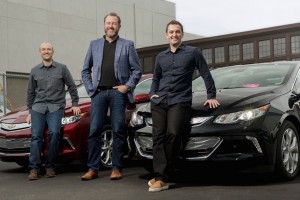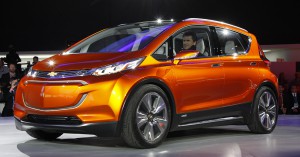Ride-sharing service Lyft has rejected a takeover bid from General Motors, according to Silicon Valley news site The Information.
The move would have turned the country’s biggest automaker into an even bigger player in the fast-growing field of alternative mobility. GM already holds a 9% stake in Lyft and also owns San Francisco based competitor Sidecar. It has also dipped its toes into the world of car-sharing, as well.
Neither GM nor Lyft will comment on the report by The Information and a second Silicon Valley news service. But sources reportedly include a “person briefed on the situation,” and comes a year after Lyft went looking for a possible buyer.
The ride-sharing service’s founders, John Zimmer and Logan Green turned to investment banking firm Qatalyst Partners, before deciding to instead seek new investors. That included GM which, early this year, pumped $500 million into the taxi alternative.
In the U.S., Lyft is the second-largest of the ride-sharing services, but well behind the emerging segment’s leader Uber. Globally, the 800-pound, motorized gorilla is Didi Chuxing. That Beijing-based firm this month agreed to acquire Uber’s business in the Chinese market. Meanwhile, Apple has moved to invest $1 billion in Didi Chuxing.
All told, nearly $30 billion has been invested in various ride-sharing services, including substantial capital injected by the auto industry. Volkswagen, for one, has pumped $300 million into the Israeli-based Gett, while BMW came up with $5 million in seed capital for the San Francisco ride-sharing start-up Scoop. Toyota has agreed to a collaboration with Uber, and Ford has set up a number of different alternative mobility programs, including both ride- and car-sharing.
A number of industry analysts are betting that if such services can drive down costs they could cut into the demand for private vehicle ownership. Uber recently set up an autonomous vehicle research center in Pittsburgh and its CEO has forecast that once the company can field a fleet of fully driverless vehicles they would be cheaper to use than owning a car.
The investment in Gett was part of a broader mobility strategy by VW which says that, it believes such services will “generate a substantial share of (its) sales revenues” by 2025.
GM has said it also expected substantial growth from alternative mobility programs and, like its rivals, is looking for a way to keep its car plants busy as consumers shift away from vehicle ownership.
(GM launches car-sharing service called Maven. For more, Click Here.)
Last March, GM and Lyft launched Express Drive, a program that lets drivers rent one of the Detroit maker’s vehicles at a relatively low price. Initially, that program focuses on the Chevrolet Equinox but Lyft driver’s will soon be able to lease one of the new Chevrolet Bolt battery-electric vehicles, as well. GM officials said, during a Bolt preview earlier this year, that the battery-car was designed specifically with ride-sharing operations in mind.
The new project could help Lyft draw drivers away from competitors such as Uber, the largest of the ride-sharing services, according to the service’s founder and CEO Zimmer. And it could help attract new drivers who currently want to work for Lyft but don’t have an acceptable vehicle. GM noted there were 60,000 potential drivers who have applied to Lyft who didn’t have a qualified ride.
“We’re making sure everyone who wants to be a Lyft driver can be, by providing ultimate flexibility at incredible rates,” Zimmer said when Express Drive was announced.
(GM expands Lyft Express Drive program. Click Here for more.)
About 15 million Americans are expected to use a ride-sharing service this year, according to research firm eMarketer.com. That is forecast to grow to 20 million by 2020. Despite the growing popularity, the services are believed to be operating deep in the red for now.
Ride-sharing services are only one of the alternatives threatening the traditional automotive business model, however. There are also an assortment of car-sharing services, such as ZipCar and Maven, the latter launched by GM earlier this year.
Globally, as many as 35 million people will use car-sharing services each month by the beginning of the next decade, forecasts the Boston Consulting Group. That will reduce global car sales by at least 550,000 vehicles by 2021, automakers taking a revenue hit of 7.4 billion euros, or $8.14 billion at the current exchange rate.
(Autonomous vehicles are expected to become a $560 bil business. Click Here for more.)


